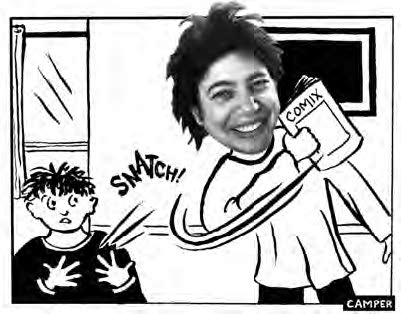 Michele Karlsberg: How important are names to you in your books? Do you choose the names based on liking the way they sound, or based on their meaning? Do you have any name choosing resources to recommend?
Michele Karlsberg: How important are names to you in your books? Do you choose the names based on liking the way they sound, or based on their meaning? Do you have any name choosing resources to recommend?
Jennifer Camper: Names are an important part of storytelling. The characters in my comics have names that help explain who they are, and that reflect personalities, age, ethnicities, gender-spectrum, physical appearance, attitudes, strengths and weaknesses. Characters might have only nicknames, or fantasy names, or boring names, or funny names, and some remain unnamed—whatever helps describe that character.
Names of characters in a story should not be too similar or readers will be confused.
 Names can sound old-fashioned or modern, sexy or repulsive, male, female or neither, exotic or ordinary, funny or serious—but not all readers will respond to names in the same way. I choose names that make sense to me and hope that my readers will understand too.
Names can sound old-fashioned or modern, sexy or repulsive, male, female or neither, exotic or ordinary, funny or serious—but not all readers will respond to names in the same way. I choose names that make sense to me and hope that my readers will understand too.
 In my comic “subGULZ,” the characters live in abandoned subway tunnels and are named Liver, Byte and Swizzle. Liver works as a hospital orderly, Byte is a computer-hacking janitor, and Swizzle is a bartender. Their nemesis is an evil police chief, a woman named Pekker.
In my comic “subGULZ,” the characters live in abandoned subway tunnels and are named Liver, Byte and Swizzle. Liver works as a hospital orderly, Byte is a computer-hacking janitor, and Swizzle is a bartender. Their nemesis is an evil police chief, a woman named Pekker.
Some of my other comics characters are more reality-based—Chango (a tough Latina dyke), Leo Rinaldi (Italian business man), Auntie Max (lesbian Aunt), or Arab-American characters named Rania, Ramzi and Samira. Currently, I’m working on a story about a hit-woman called Jones. She says it’s not her real name, but her true name is never revealed.
I collect ideas for names wherever I encounter them. Also, I scour lists of names for plants, animals, insects, minerals, chemicals, geography, astronomy, mythology, medical terms, etc. for name ideas. And, of course, sometimes I use the names of my friends.
Cartoonist Jennifer Camper’s books include “Rude Girls and Dangerous Women” and “subGURLZ,” and she is the editor of two “Juicy Mother” comix anthologies. Her cartoons and illustrations have appeared in magazines, newspapers, comic books and anthologies, and have been exhibited internationally. Website: www.jennifercamper.com
Shawn Stewart Ruff: Mostly, my characters introduce themselves to me with their first, middle and last names. That doesn’t mean I’m convinced they are who they say they are, any more than they are pleased with the worlds I’ve planned for them to live in. A timeout usually takes care of this: truly, out of sight, out of mind. Whether a month or many years hence, by the time we reconnect, I’ve forgotten their names, as I often promptly do upon meeting strangers. They have the freedom to change—not just their names, but also their gender, race, politics—for I believe in the power of transformation.
This process is also influenced by my life. Names from childhood stick around, plus I encounter new people whose monikers tickle, intrigue, amuse, and stay with me. I may meet them in social and professional situations, or even transiting through time zones.
As often, names from my fiction and nonfiction reading, as well as favorite films, linger. Motifs and themes can also play a role. In my last novel, the protagonist, on our third meeting, re-introduced himself as Yale, which conjured an image of a lock that requires a combination or key. Around his name I constructed histories of an escape from American slavery, and of an emotional imprisonment that was the result of AIDS-born tragedy and sadness.
Sometimes I’m curious to know if a name has a story or notable provenance. Google usually has the answer.
Lambda Literary Award-winning writer and editor Shawn Stewart Ruff has authored two novels, with a third, “The Griffin Jewels Saunders,” debuting July 2015.
Michele Karlsberg Marketing and Management specializes in publicity for the LGBT community. This year, Karlsberg celebrates twenty-five years of successful book campaigns.
Recent Comments